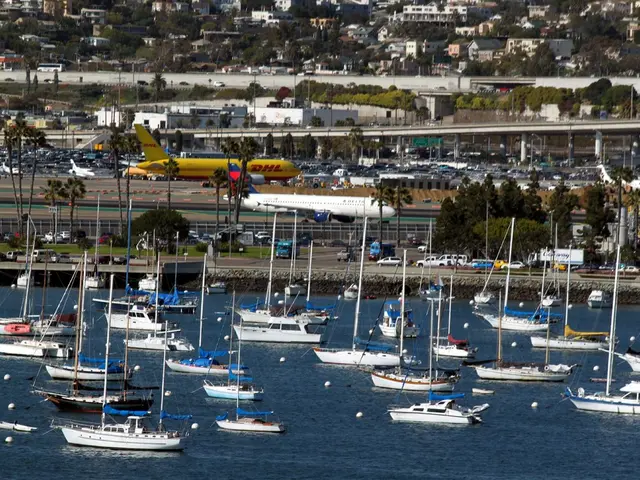Selling Out German Gas: Merkel's Inaction on Gazprom Deal Unveiled
Gazprom Deal Sealed Through Merkel's Subtle Nods
Sit down, folks, because we're about to spill some seriously juicy tea on ol' Chancellor Merkel. Remember her, the one who led Germany through the political scene for years? Well, it looks like the crazy behind the curtain with Russia just got a little damn crazier. The Chancellery's been forced to fess up about those shady Merkel-Gazprom connections, and let me tell you, it ain't pretty.
Turns out, Merkel didn't intervene when Gazprom - you know, that Russian state-owned gas behemoth - snatched up German gas storage facilities. Now, why would she allow that, you ask? Internal warnings, Ukraine's invasion, and a lack of Russian gas in those chilly winter months were more than reasons to keep the Kremlin's claws out of our backyard, but nope. Merkel was down for the deal, baby.
The documents say it all - Merkel was playin' both sides of the fence, making a public show of support for Ukraine against Russia, while secretly kissin' Gazprom's ass. And guess who was in on this little secret? SPD Economics Minister Sigmar Gabriel. The Chancellery argued they had no legal grounds to stop the deal, even though they knew it'd put German city utilities, suppliers, and power plants in Gazprom's dirty little hands.
The Germans didn't want to create a stink, though, so they cooked up some clever spin to explain their actions to Poland, Ukraine, and the Baltic states. Don't worry, it didn't hold water, but they tried their best. The Gas storage deal didn't violate any Russia sanctions, and neener-neener, they couldn't stop it through the German Gazprom subsidiary. Ain't that just peachy?
The Chancellery eventually coughed up 63 documents, battle-scarred and hidden away, thanks to legal pressure. The Süddeutsche Zeitung dug 'em up and flung 'em into the spotlight, 'cause Merkel couldn't keep secrets worth squat.
Now, let's look at the Nord Stream 2 pipeline project - another example of Merkel's shifty tactics. The German government secretly backed the construction of the pipeline, while publicly presenting it as a neutral economic venture. Merkel and her crew played coy, downplaying the risks and squealing about the advantages for Gazprom's struggling gas business.
So, there you have it. Merkel greenlit Gazprom's takeover, all while knowing the potential dangers. It's no big surprise that Germany's been in a deep energy crisis since then, left holdin' the bag when Russia dropped them like a hot potato.
Source: ntv.de, mau
- Gazprom
- Angela Merkel
- Crimea
- Attack on Ukraine
The Nitty Gritty
Economic Interests: Germany's dependence on Russian gas made it vital to maintain strong economic ties with Moscow. Allowing Gazprom to purchase German gas storage facilities was seen as a way to keep the relationship strong and secure a steady energy supply. This strategy aimed at engaging with Russia economically while negotiating geopolitical tension.
Geopolitical Considerations: Merkel's government was walking a delicate tightrope in interactions with Russia, hoping that economic engagement would positively influence Russia's behavior. However, such an approach was criticized for being too lenient, ignoring geopolitical contingencies.
Internal Warnings: Concerns about increased dependence on Russian energy and the strategic implications of supporting Gazprom's expansion plans were brushed aside, with economic interests and the desire to avoid conflict with Russia taking precedence.
The Fallout
Energy Security: In allowing Gazprom to control key infrastructure, Germany exposed itself to potential political and economic leverage by Russia. The sale highlighted the nation's vulnerability in terms of energy security.
Geopolitical Impact: Merkel's decision to greenlight the Gazprom deal was seen as inconsistent with Western responses to Russia's actions in Ukraine. It underscored the challenge faced by nations seeking to balance economic interests with geopolitical realities, particularly in the context of European energy security.
Current Developments: The ongoing conflict in Ukraine and increased tensions between Russia and Western countries have led Germany, under Chancellor Olaf Scholz, to reevaluate its energy and security policies. Scholz's administration is working towards reducing dependence on Russian energy and enhancing military capabilities in response to the evolving geopolitical landscape[1].
- The revelation of Chancellor Angela Merkel's inaction on Gazprom's acquisition of German gas storage facilities has sparked controversy, as it coincided with internal warnings about increased dependence on Russian energy and geopolitical considerations.
- This deal, driven by Germany's economic interests and a perceived need to maintain strong ties with Russia, has been criticized for ignoring geopolitical contingencies, particularly concerning Ukraine's invasion and Crimea.
- As a result, the energy security of Germany was compromised, making the nation vulnerable to potential political and economic leverage by Russia. This incident underscores the delicate balance between economic interests and geopolitical realities, especially in the European energy sector.








